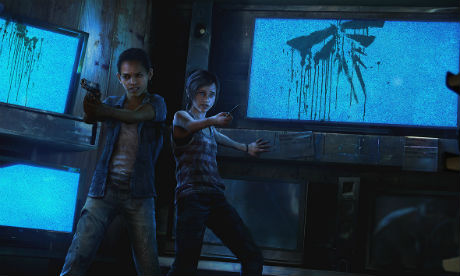
Although there's a slowly gathering flock of interesting individual characters in video games, there is still a dearth of interesting relationships. The one dynamic that games have been most interested in exploring is that between parent and child; The Walking Dead, Bioshock Infinite, even Pikmin, all are parenting games to an extent. The Last of Us played on this theme as well, telling the story of a gruff, reluctant guardian and a 14-year-old girl who doesn't need looking after, but this downloadable side-story focuses on a friendship instead.
The Last of Us: Left Behind is the story of Ellie's relationship with her best friend, Riley, back in Boston, intertwined with a lesser-explored period of Ellie and Joel's journey across the continent years later. It flashes back and forth between time periods, exerting the same masterful command of tension and pacing (and your heart-rate) that Naughty Dog established in last year's full-length game. Throughout, you never leave Ellie's point of view. This is the first portrayal of a friendship between adolescent girls that I've ever seen in a video game (excepting Gone Home's documented one), and it's wonderfully done. Theirs is an ordinary and beautiful teenage friendship under extraordinary circumstances, potently relatable despite the shambling infected and ruined urban landscape.
I can't tell you much about the individual moments that struck me without lessening their impact. I can tell you that I was reminded of what it feels like to be a teenager, how intense everything is, the difficulty of leaving behind childish things that still give you joy, that struggle to keep close to your friends when you're both changing so much. In just a few hours it communicates the intensity of a best friendship, the fights and the shared silliness and the reluctant need for each other. Any complaints about Left Behind's length are comprehensively outweighed by its emotional density. It says so much in its few hours.
It doesn't feel overblown, either, which is impressive considering the subject matter; it's deftly handled. If you were paying attention during The Last of Us' main plot, you'll already know how the story ends, but how it plays out surprised and deeply saddened me nonetheless. If anything, knowing the outcome imbues the whole thing with extraordinary poignancy. Knowing is almost unbearable at times, when Ellie and Riley are joking around together. This is a day in Ellie's life that profoundly shaped her.
Ellie was always the star of The Last of Us for me - funny, resilient, endearingly rebellious, capable even when she's scared. Without Joel in the frame we can get to know her better, see how she handles herself alone. There were flashes of this in the main plotline, but here it's the whole story. The two timelines don't emphasise how much time and experience have changed her. They show which parts of her have stayed the same.
Left Behind does nothing new with The Last of Us' tense and exhilarating gameplay rhythm; you're always either in intense danger, or fearfully anticipating the next moment of intense danger. But it tells a different story, one that's more compact and more affecting for it, and it shows that Naughty Dog has serious emotional range. Rarely have I played anything as powerful.

